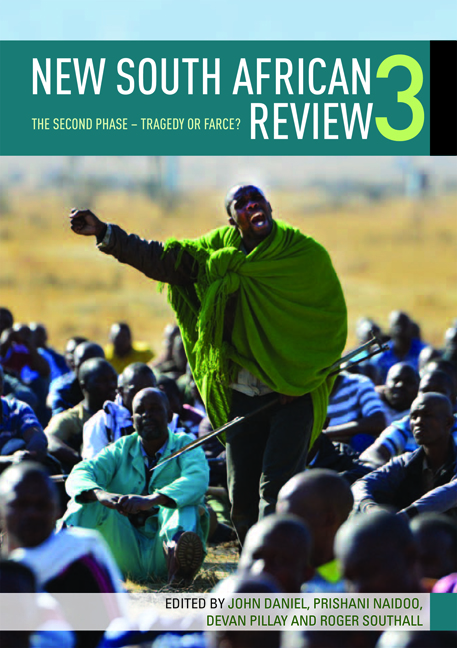Book contents
- Frontmatter
- Contents
- Preface
- Introduction: The second phase – tragedy or farce?
- PART 1 Party, Power and Class
- PART 2 Ecology, Economy and Labour
- Introduction: Ecology, economy and labour
- Chapter 5 Mass unemployment and the low-wage regime in South Africa
- Chapter 6 Nationalisation and the mines
- Chapter 7 Broad-based BEE? HCI's empowerment model and the syndicalist tradition
- Chapter 8 ‘Ask for a camel when you expect to get a goat’: Contentious politics and the climate justice movement
- Chapter 9 Hydraulic fracturing in South Africa: Correcting the democratic deficits
- PART THREE Public Policy and Social Practice
- PART 4 South Africa at Large
- Contributors
- Index
Chapter 9 - Hydraulic fracturing in South Africa: Correcting the democratic deficits
from PART 2 - Ecology, Economy and Labour
Published online by Cambridge University Press: 31 May 2019
- Frontmatter
- Contents
- Preface
- Introduction: The second phase – tragedy or farce?
- PART 1 Party, Power and Class
- PART 2 Ecology, Economy and Labour
- Introduction: Ecology, economy and labour
- Chapter 5 Mass unemployment and the low-wage regime in South Africa
- Chapter 6 Nationalisation and the mines
- Chapter 7 Broad-based BEE? HCI's empowerment model and the syndicalist tradition
- Chapter 8 ‘Ask for a camel when you expect to get a goat’: Contentious politics and the climate justice movement
- Chapter 9 Hydraulic fracturing in South Africa: Correcting the democratic deficits
- PART THREE Public Policy and Social Practice
- PART 4 South Africa at Large
- Contributors
- Index
Summary
Land grabbing is clearly not confined to examples of appropriation for agricultural use, but can also apply to the acquisition of extractive resources. In the case of South Africa, the advent of shale gas exploration has made over 20 per cent of the country's land area vulnerable to acquisition by transnational oil companies. Though the surface of the land may be owned by existing local landowners, mineral and petroleum legislation allows for the allocation of exploration rights under the surface by the state to be granted to transnational as well as to domestic corporations.
This chapter will examine the potential impacts of the shale gas industry in South Africa on people and the environment. The lifting, on 7 September 2012, of a government moratorium on the mining of shale gas, brings exploitation of the resource much closer to realisation.
Despite having experienced almost two decades of constitutional democracy, South Africans still have no transparent and participatory mechanisms for deciding democratically on the uptake of new technologies or development projects, particularly those that affect millions of lives and livelihoods. There are limited opportunities for intervention in very circumscribed public participation processes linked to narrow administrative decisions rather than to broad policy questions. The processes of sharing any sovereignty with citizens in the name of producing better public policy are often derisory. When citizens are left out of debates confined to government and the business community, the only ways of influencing policy are to petition, protest, or litigate, usually after the horse has already bolted.
Examples of this abound, especially in relation to controversial technologies. Government took little trouble to consult the public on questions of building the now defunct pebble bed modular nuclear reactor; of allowing aluminium smelters to consume massive amounts of the country's once cheap electricity; or of the introduction of genetic modification of our food crops (Fig 2007; Fig 2010a; Hallowes 2011). The mining industry has almost free range in operating in fragile buffer areas around world heritage sites or in the face of opposition from local communities (Capel 2012). Adjudication of these kinds of conflicts is usually through government fiat, not through any fair, transparent, democratic consultation process.
- Type
- Chapter
- Information
- New South African Review 3The second phase - Tragedy or Farce?, pp. 173 - 194Publisher: Wits University PressPrint publication year: 2013



